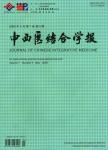Traditional herbal medicine in preventing recurrence after resection of small hepatocellular carcinoma: a multicenter randomized controlled trial
Traditional herbal medicine in preventing recurrence after resection of small hepatocellular carcinoma: a multicenter randomized controlled trial作者机构:Changhai Hospital of Traditional Chinese Medicine Second Military Medical University Department of Hepatic Surgery Eastern Hepatobiliary Surgery Hospital Second Military Medical University Liver Cancer Institute Fudan University Department of Traditional Chinese Medicine Zhongshan Hospital Fudan University Department of Hepatic Surgery the First Affiliated Hospital of Guangxi Medical University Department of Hepatobiliary Surgery Tumor Hospital of Guangxi Medical University
出 版 物:《Journal of Integrative Medicine》 (结合医学学报(英文版))
年 卷 期:2013年第11卷第2期
页 面:90-100页
学科分类:1006[医学-中西医结合] 1002[医学-临床医学] 100214[医学-肿瘤学] 100602[医学-中西医结合临床] 10[医学]
基 金:Supported by a grant from the Ministry of Science and Technology of China (National Key Technology Research & Development Program No. 2006BAI 04A06)
主 题:hepatocellular carcinoma recurrence traditional Chinese medicine transarterial chemoembolization: randomized controlled trial
摘 要:BACKGROUND: Disease recurrence is a main challenge in treatment of hepatocellular carcinoma (HCC). There is no generally accepted method for preventing recurrence of HCC after resection. OBJECTIVE: To compare the efficacy of a traditional herbal medicine (THM) regimen and transarterial chemoembolization (TACE) in preventing recurrence in post-resection patients with small HCC. DESIGN, SETTING, PARTICIPANTS AND INTERVENTIONS: This is a multicenter, open- label, randomized, controlled study, which was undertaken in five centers of China. A total of 379 patients who met the eligibility criteria and underwent randomization were enrolled in this trial. One hundred and eighty-eight patients were assigned to the THM group and received Cinobufacini injection and Jiedu Granule, and the other 191 patients were assigned to the TACE group and received one single course of TACE. MAIN OUTCOME MEASURES: Primary outcome measures were the annual recurrence rate and the time to recurrence. Incidence of adverse events was regarded as the secondary outcome measure. RESULTS: Among the 364 patients who were included in the intention-to-treat analysis, 67 patients of the THM group and 87 of the TACE group had recurrence, with a hazard ratio of 0.695 (P = 0.048). Median recurrence-free survival of the patients in the THM and TACE groups was 46.89 and 34.49 months, respectively. Recurrence rates at 1, 2 and 3 years were 17.7%, 33.0% and 43.5% for the THM group, and 28.8%, 42.5% and 54.0% for the TACE group, respectively (P = 0.026). Multivariate analysis indicated that the THM regimen had a big advantage for prolonging the recurrence-free survival. Adverse events were mild and abnormality of laboratory indices of the two groups were similar. CONCLUSION: In comparison with TACE therapy, the THM regimen was associated with diminished risk of recurrence of small-sized HCC after resection, with comparable adverse events. TRIAL REGISTRTION IDENTIFIER: This trial was registered in the Chinese Cli



